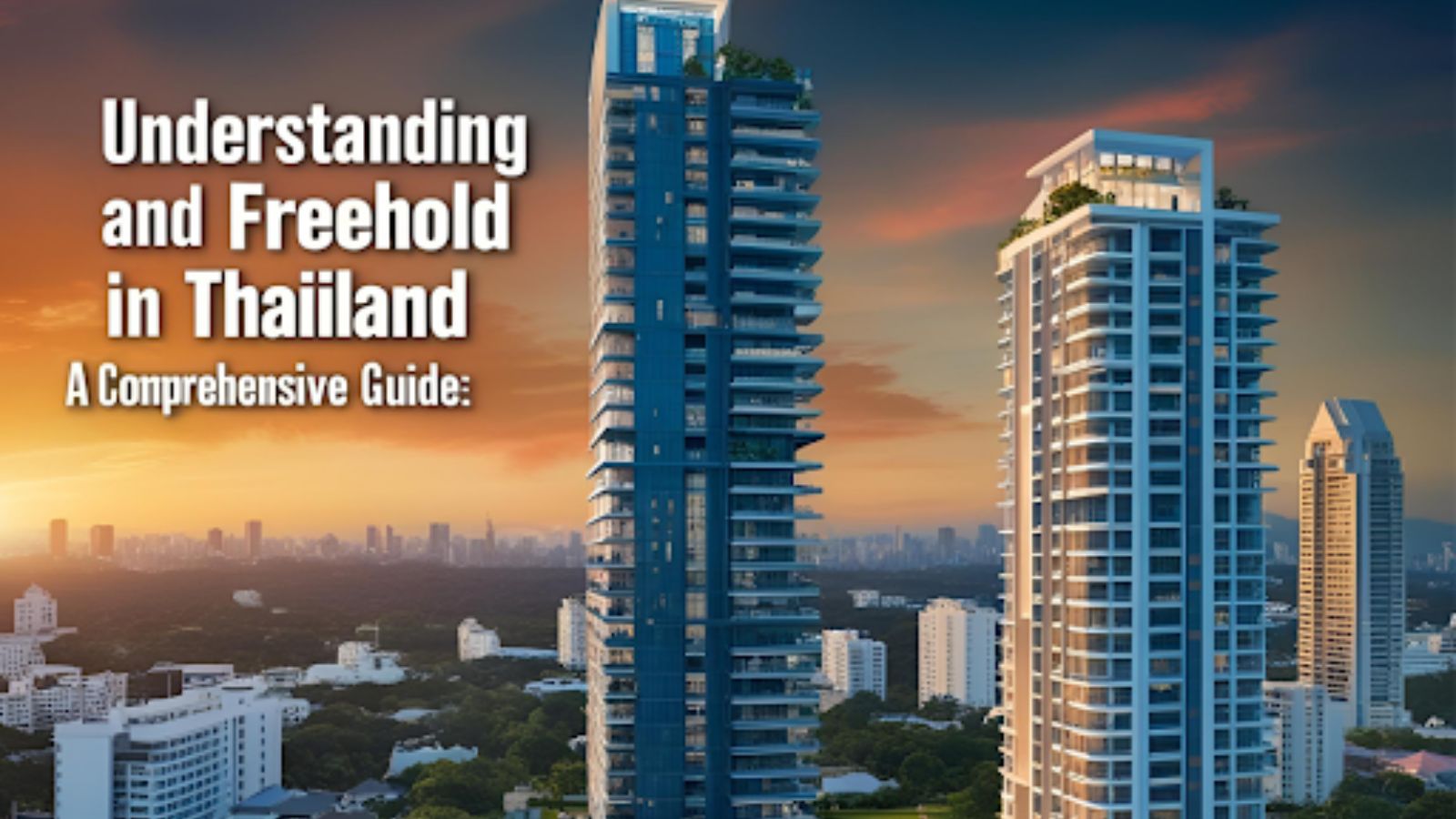Navigating the nuances of property ownership is a crucial step for anyone looking to invest or live in Thailand. The country’s property market offers diverse and enticing opportunities—from vibrant condominiums in Bangkok to serene villas in Phuket. But to make a sound investment, you need a solid understanding of the two key ownership structures available in Thailand: leasehold and freehold.
This guide provides a clear breakdown of leasehold and freehold ownership in Thailand, helping you decide which option aligns best with your goals, whether you’re a foreign national, retiree, or investor seeking long-term security.
What is Freehold Ownership in Thailand
Defining Freehold Ownership
Freehold ownership grants outright and indefinite control over a property. For Thai nationals, this applies to both land and buildings, while for foreigners, it’s typically limited to condominium units. This is governed by the Condominium Act, which allows non-Thais to own up to 49% of the total units in a condominium building.
Advantages of Freehold
- Permanent Ownership: Freehold properties provide perpetual ownership rights, meaning you own the property indefinitely, with no expiration or time limits. This ensures complete control and flexibility over the property.
- Investment Security: Freehold properties are often considered a secure and stable investment, thanks to their potential for long-term appreciation in value. Unlike leasehold, freehold properties are often more attractive to buyers, adding to their resale value and investment appeal.
- Inheritance-Friendly: Freehold properties can be easily transferred to heirs, making them a practical choice for long-term family assets. This seamless inheritance process ensures that your property remains within your family for generations to come.
- Voting Rights: Owners of condominiums under freehold arrangements typically enjoy voting privileges in property management. This means you have a say in communal decisions, such as maintenance, upgrades, or shared amenities, ensuring the property is managed in your best interest.
Drawbacks of Freehold
- Higher Costs: Freehold properties demand a significantly higher upfront investment compared to leasehold options, as you are purchasing full ownership of the land or property. Additionally, they come with higher transfer fees and taxes, which can add to the overall cost of acquisition. This makes freehold properties a premium choice, often suited for those with long-term plans and larger budgets.
- Complex Processes: For foreigners, acquiring land under a freehold arrangement is particularly challenging due to Thai property laws that restrict direct ownership of land by non-citizens. This often necessitates legal workarounds, such as forming a Thai company or entering into a joint venture with a Thai national. These processes can be time-consuming and require expert legal and financial advice to navigate successfully while ensuring compliance with local regulations.
Who Benefits from Freehold Ownership?
Freehold is perfect for long-term investors, residents planning to stay permanently, or those purchasing condominiums within the foreign ownership quota. It provides unmatched security and control over your property while ensuring lasting value.
What is Leasehold Ownership in Thailand
Defining Leasehold Ownership
Leasehold is a legal framework that allows the lessee (tenant) to use and occupy a property for a fixed period, typically 30 years, with potential renewal terms for two additional 30-year periods. However, these renewals are not legally guaranteed unless explicitly included in the agreement.
Leasehold properties are particularly popular among foreigners, given the restrictions on owning land outright in Thailand.
Advantages of Leasehold
- Lower Costs: Leasehold properties are generally 10–15% cheaper than freehold alternatives, making them a more budget-friendly option for buyers. This affordability opens the door to homeownership for those who might otherwise be priced out of the market.
- Flexibility: Leasehold agreements are perfect for those looking for temporary stays, mid-term investments, or a home without the long-term commitment of freehold ownership. This flexibility is especially appealing for expatriates, seasonal residents, or individuals who anticipate relocating in the future.
- Simplified Ownership: For foreigners, leasehold agreements provide an easier way to secure rights to houses and villas, especially in countries where property laws limit freehold ownership for non-citizens. This is particularly useful in high-demand areas where the condominium freehold quota is full, offering an alternative route to owning a property.
Drawbacks of Leasehold
- Limited Ownership: Leaseholders do not own the property outright, which restricts their ability to make significant renovations, structural changes, or modifications without explicit permission from the property owner. This lack of full ownership can feel limiting for those who want to personalize their space.
- Renewal Uncertainty: Once the lease period ends, the renewal terms depend entirely on the discretion of the lessor. This could involve renegotiating rent, lease conditions, or even the possibility of not having the lease renewed, creating uncertainty for the leaseholder.
- No Voting Rights: Unlike property owners, leaseholders typically have no say in property management decisions or communal matters, such as maintenance upgrades, shared facilities, or neighborhood policies, which can leave them feeling excluded from important decisions affecting their living environment.
Who Benefits from Leasehold Ownership?
Leasehold is ideal for those seeking affordability, mid-term flexibility, or access to prime property markets where freehold ownership may be less viable for foreigners.
Leasehold vs Freehold A Side-by-Side Comparison
| Aspect | Leasehold | Freehold |
| Ownership Rights | Use and occupation during lease term | Full, indefinite ownership |
| Duration | 30 years (renewable to 90 years) | Permanent |
| Transferability | Limited to lease term conditions | Fully transferable |
| Costs | Lower upfront and registration fees | Higher upfront and transfer fees |
| Legal Security | Requires lease registration at Land Department | Full legal title registration |
| Foreign Ownership | Accessible to foreigners via lease agreement | Limited to condominium units (49% quota) |
| Control and Freedom | Limited renovation and management control | Full control over property and its use |
 How Foreigners Can Choose the Right Option
How Foreigners Can Choose the Right Option
When Freehold Makes Sense
- You plan to permanently settle in Thailand and want a property that offers stability and aligns with your long-term living goals. Finding a home that fits your vision for the future is essential to ensure you can build a comfortable and secure life in the country.
- You’re within the foreign quota for condominiums, ensuring your purchase complies with Thailand’s property ownership regulations. Staying within these legal limits is crucial to avoid complications and ensure your investment is fully protected under Thai law.
- Long-term investment security is your priority, and you’re looking for a property that will retain or increase its value over time. You want to make a financially sound decision that will serve as both a home and an asset for years to come.
- You want full control over property decisions, including the ability to renovate, manage, and pass on the property to your heirs without restrictions. Owning a property that allows flexibility ensures you can personalize it to suit your needs and secure it as part of your legacy.
When Leasehold is the Better Choice
- You’re looking for a cost-effective way to enter Thailand’s property market without committing to the high upfront costs typically associated with full ownership. This allows you to explore opportunities while managing your budget more effectively.
- Your plans involve temporary residence or a short- to medium-term investment, making it ideal for those seeking flexibility or testing the waters before committing to a long-term arrangement.
- You’re focused on houses or villas in prime locations where freehold ownership isn’t an option for foreigners, ensuring you can still access desirable properties while adhering to local regulations.
Critical Considerations for Property Ownership in Thailand
Before purchasing property, it’s important to cover all legal and logistical bases to avoid costly mistakes and misunderstandings.
- Hire a Property Lawyer: Partner with a qualified Thai real estate legal expert to review contracts and ensure the terms of your lease or purchase are secure and in compliance with local laws. A lawyer can help you avoid pitfalls and protect your investment.
- Negotiate Lease Renewals: If you choose a leasehold property, make sure the renewal options are explicitly stated in the agreement. Clarify terms such as renewal fees and duration to avoid any surprises when the lease term ends.
- Understand Ownership Laws: Familiarize yourself with Thai regulations regarding foreign property ownership. For instance, foreigners cannot directly own land but can purchase condominiums or lease land under specific conditions. Understanding these laws is crucial to making the right decision.
- Register Agreements: Both leasehold and freehold agreements must be officially registered with the Land Department to ensure they are legally binding and recognized by the authorities. Registration protects your rights as the buyer or lessee.
- Plan for Taxes and Fees: Take all additional costs into account, including property taxes, transfer fees, and registration fees. These expenses can add up significantly and should be factored into your budget before finalizing your purchase. Proper planning ensures there are no financial surprises down the line.
Making an Informed Decision
Thailand’s property market offers exceptional opportunities for all types of buyers, whether you’re laying the foundation for a permanent home or testing the waters for investment potential.
Freehold ownership provides permanence, security, and full property rights, making it ideal for long-term goals. On the other hand, leasehold ownership offers affordability, flexibility, and accessibility to foreigners for shorter stays or diversified investment strategies.
The key to unlocking the best value from your property lies in your goals, priorities, and future plans. With the right research and professional guidance, your dream property in Thailand is closer than you think.
Looking for more expert advice? Consult with a qualified Thai legal or real estate professional to help guide your next steps.


 How Foreigners Can Choose the Right Option
How Foreigners Can Choose the Right Option
More Stories
Slot Bankroll Tips: How To Play Longer Without Overspending
Escort Platforms That Match Modern Expectations
Smart Home Technology for Roof Monitoring: Gadgets That Protect Your Biggest Investment